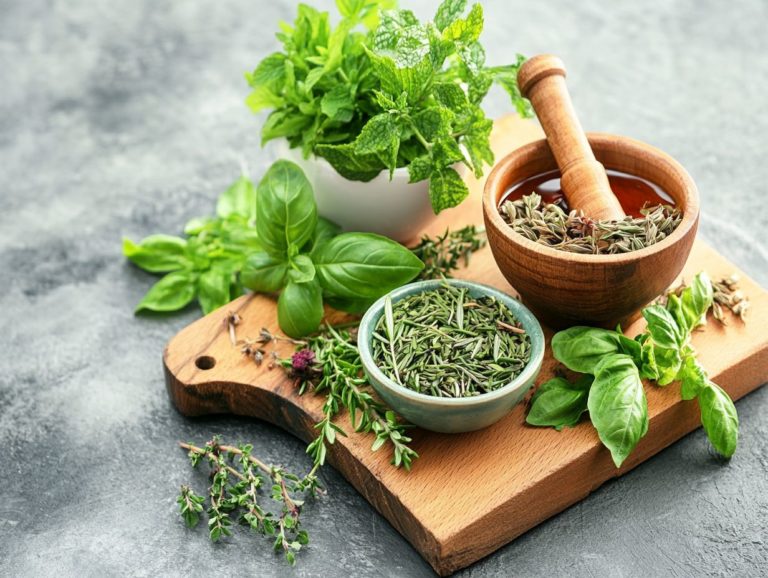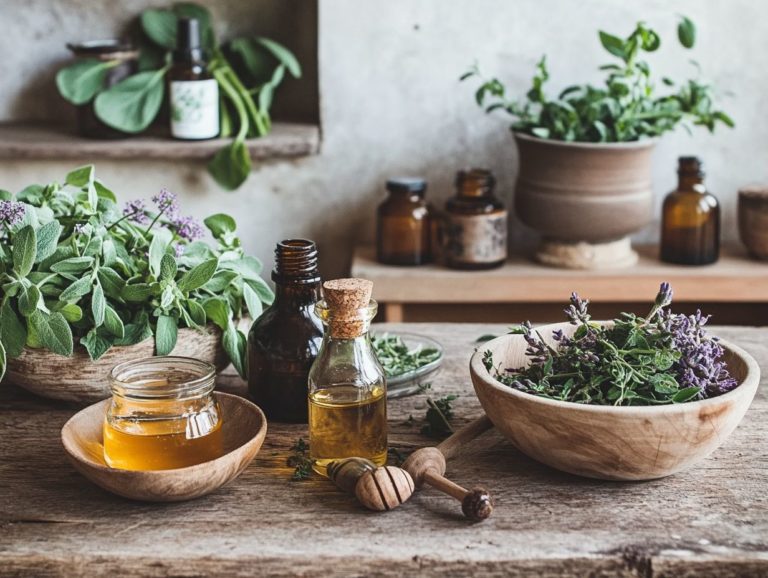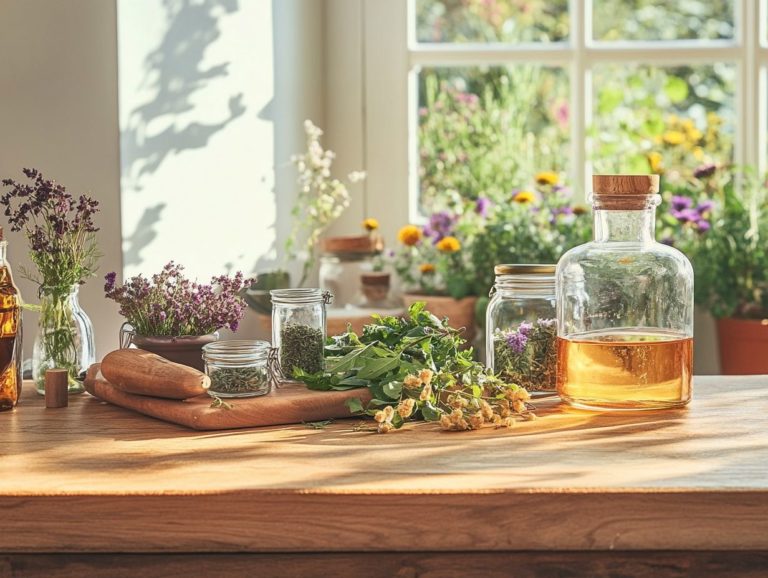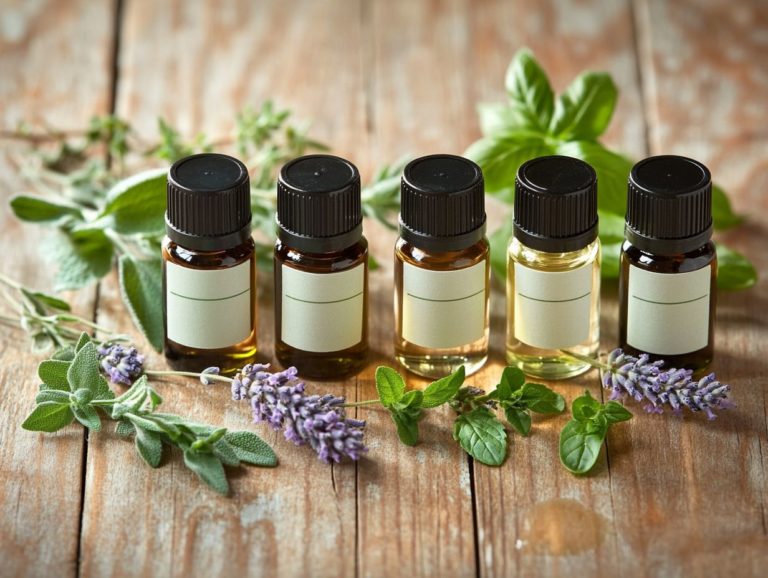5 Ways to Incorporate Herbs into Your Diet
Herbs are more than just flavor enhancers; they are your powerful allies in health and culinary creativity.
Consider these five simple yet effective ways to weave fresh and dried herbs into your meals, from vibrant herbal teas to infused oils that can elevate even the most mundane dishes.
Explore the myriad benefits of incorporating herbs into your diet, familiarize yourself with popular varieties, and gain valuable tips on cultivating your own.
Whether you are a seasoned chef or just dipping your toes into the culinary waters, these insights will inspire you to embrace the aromatic world of herbs in your kitchen.
Contents
- Key Takeaways:
- 1. Add Fresh Herbs to Your Meals
- 2. Make Herbal Infused Oils and Vinegars
- 3. Use Dried Herbs in Cooking
- 4. Make Herbal Teas and Drinks
- 5. Create Herbal Seasoning Blends
- What Are the Benefits of Incorporating Herbs into Your Diet?
- How Can You Grow Your Own Herbs at Home?
- What Are the Different Types of Herbal Supplements?
- How Can You Use Herbs for Medicinal Purposes?
- What Are Some Delicious Recipes Using Herbs?
- Frequently Asked Questions
- What are the benefits of incorporating herbs into your diet?
- How can I incorporate herbs into my daily meals?
- What are some common herbs that are easy to find?
- Can I grow my own herbs to add to my diet?
- Are there any risks or side effects of adding herbs to my diet?
- How can I use herbs if I don’t like the taste?
Key Takeaways:
- Experiment with adding fresh herbs to your meals to enhance flavor and boost nutritional value.
- Create herbal-infused oils and vinegars for a quick and easy way to incorporate herbs into your dishes.
- Utilize dried herbs in cooking for a longer shelf life and convenience in meal preparation.
1. Add Fresh Herbs to Your Meals
Incorporating fresh herbs like parsley, basil, oregano, and mint into your meals not only enhances the flavor but also offers health benefits. These include supporting heart health and delivering essential phytonutrients plant nutrients that support health for overall well-being. These herbs are truly critical for summer cooking and flavorful dishes.
Imagine transforming everyday recipes into culinary masterpieces with these vibrant additions. Basil, for instance, can elevate a simple tomato salad or take center stage in homemade pesto. Meanwhile, parsley offers a delightful garnish for tabbouleh or roasted vegetables.
Oregano isn t just a pizza topping; it pairs beautifully with grilled chicken, adding a Mediterranean flair that s hard to resist. And let s not forget mint, which infuses refreshing notes into your summer drinks or yogurt-based sauces.
Beyond their delightful flavors, these herbs also aid digestion and provide essential vitamins, making it easy to enjoy a well-rounded, nutritious meal. To truly maximize their impact, add them toward the end of cooking or use them fresh in dressings to preserve their aromatic qualities.
2. Make Herbal Infused Oils and Vinegars
Herbal-infused oils and vinegars are a straightforward way to enhance your dishes, bringing rich flavors and nutritional benefits with the infusion of various herbs like lavender, rosemary, and thyme.
By carefully selecting herbs that complement each other, you can elevate dishes that range from fresh salads to savory marinades. For example, combining basil with garlic in olive oil results in a fragrant dressing that s perfect for drizzling over ripe tomatoes or grilled vegetables.
Alternatively, infusing apple cider vinegar with dill and cucumber offers a vibrant pickling solution that can elevate sandwiches and salads alike.
Infusions add zest and character to your meals while providing health benefits, such as improved digestion and antioxidant properties. Dive into experimenting with flavor combinations; try pairing chili flakes with oregano for a delightful kick in your culinary adventures.
3. Use Dried Herbs in Cooking
Dried herbs present a convenient and powerful alternative to fresh varieties, allowing you to savor the concentrated flavors of culinary staples like oregano, sage, and basil even in off-seasons.
To maximize these dried treasures, it s vital to incorporate them effectively into your dishes. When substituting dried herbs for fresh ones, a useful guideline is to use one-third of the amount, as dried herbs pack a punch with their concentrated flavor. For example, if a recipe calls for three teaspoons of fresh basil, just one teaspoon of the dried version will do the trick.
Since dried herbs can lose their potency over time, store them in a cool, dark place in airtight containers to preserve their flavors. When you re ready to add dried herbs to your recipes, introduce them early in the cooking process. This allows them to rehydrate and infuse their delightful aroma into the dish, ensuring every bite is a burst of flavor.
Start incorporating herbs into your meals today and discover a world of flavor!
4. Make Herbal Teas and Drinks
Crafting herbal teas and drinks with fresh ingredients like mint, cilantro, and lavender refreshes your palate and offers remarkable health benefits. They act as a natural digestive aid and a source of antioxidants.
By incorporating a variety of herbs, you can elevate the flavor profile while maximizing wellness effects. For instance, adding chamomile brings calming properties, making it a superb choice for evening relaxation. On the other hand, ginger adds a zesty kick and helps ease nausea.
When preparing these delightful brews, steep the herbs in hot water for several minutes to allow their essential oils and goodness to meld. A squeeze of lemon or a drizzle of honey can enhance sweetness and boost vitamin C content, transforming each sip into a flavorful, healthful experience.
5. Create Herbal Seasoning Blends
Creating your own herbal seasoning blends allows you to customize flavors while reaping the nutritional benefits of various herbs. Enjoy the anti-inflammatory magic of turmeric and the aromatic charm of thyme.
Experiment with different combinations to uncover unique flavor profiles that elevate everyday dishes, turning a simple meal into a delicious meal. For example, a blend of rosemary and oregano adds warm, earthy richness to roasted vegetables, while a zesty citrus herb mix brings refreshing brightness to grilled fish.
These blends offer health perks, such as improved digestion and a boost in antioxidant intake. The beauty of herbal seasoning lies in its versatility, infusing delightful flavors into soups, marinades, or salad dressings. With each sprinkle, you make healthy cooking enjoyable and profoundly satisfying.
What Are the Benefits of Incorporating Herbs into Your Diet?
Incorporating a diverse array of herbs into your diet unlocks a wealth of health benefits. Enjoy a boost in antioxidants that keeps you feeling vibrant! Experience enhanced heart health and enriching phytonutrients that contribute to longevity and overall wellness, as noted by researchers like Dr. Wei Zheng in the Journal of Agricultural and Food Chemistry.
These powerful plant compounds combat oxidative stress while boosting your body’s ability to absorb essential nutrients more efficiently. For example, ginger and turmeric are renowned for improving digestive health, facilitating better nutrient assimilation.
Regularly enjoying herbs like basil and rosemary can significantly bolster your preventive health measures. They help reduce the risk of chronic diseases by supporting immune function and lowering inflammation in your body.
The scientific literature underscores that integrating these aromatic plants into your meals enhances your overall health and elevates your culinary experience, making every dish a delight for your senses.
What Are the Most Commonly Used Herbs in Cooking?
Some of the most beloved culinary herbs, like parsley, basil, sage, and oregano, elevate flavors and offer essential nutrients and antioxidants that support your health.
These herbs serve purposes beyond simple seasoning. For example, parsley‘s fresh, vibrant taste enhances the nutrition of salads and sauces. Basil, with its sweet and slightly peppery notes, is perfect for pesto and Caprese salads. Sage brings a robust, earthy profile that pairs beautifully with rich meats, while oregano is known for its impressive antibacterial properties.
Incorporating these herbs can truly transform a dish. Imagine adding chopped fresh basil to your pasta just before serving or sprinkling oregano over roasted vegetables to amplify both flavors and health benefits.
Why not experiment with these herbs in your next dish?
How Can You Grow Your Own Herbs at Home?
Growing your own herbs at home is not just a pastime; it’s a delightful and rewarding journey that puts fresh ingredients right at your fingertips, ideal for enhancing seasonal cooking and culinary masterpieces.
Beyond just boosting flavors, cultivating an herb garden gives you a profound sense of accomplishment and a deeper connection to the food you prepare. To embark on this gratifying adventure, start by choosing a sunny spot in your garden or a windowsill that basks in at least six hours of sunlight each day.
Then, select herbs that excite your palate. Popular favorites include basil, cilantro, and thyme. Prepare the soil meticulously, ensuring it drains well while still retaining enough moisture. After planting, a routine of diligent watering and occasional pruning will keep your herbs thriving, ready to elevate your home-cooked meals with their vibrant, fresh flavors.
What Are the Different Types of Herbal Supplements?
Herbal supplements encompass a diverse array of medicinal herbs and extracts, each offering distinct health benefits that cater to various needs from enhancing digestion to boosting immunity.
Natural remedies have surged in popularity, largely due to their natural method and the often reduced side effects when compared to pharmaceuticals. For example, echinacea is commonly sought after to ward off colds and bolster the immune system, while ginger is celebrated for its ability to ease nausea and promote digestive health.
Research indicates that turmeric contains curcumin, a compound known for its anti-inflammatory properties, making it particularly advantageous for conditions like arthritis. As more individuals gravitate toward these remedies, grasping their efficacy and the underlying science becomes essential for making well-informed health choices.
How Can You Use Herbs for Medicinal Purposes?
Using herbs for medicinal purposes is a time-honored practice that has stood the test of centuries. Many herbs offer anti-inflammatory properties, antioxidants, and various health benefits that can bolster your overall wellness.
The rich histories of these herbs not only underscore their therapeutic effects but also reveal a profound connection between humanity and nature. As you explore herbal remedies, you ll likely stumble upon a treasure trove of options from soothing chamomile to alleviate anxiety to invigorating ginger that supports digestive health.
Craft teas, tinctures, and salves to harness the power of these remarkable plants. A simple infusion of lemon balm can promote relaxation, while a homemade eucalyptus steam inhalation might just clear those stubborn sinuses.
As more individuals embrace the allure of natural remedies, understanding how to effectively utilize these herbs can significantly enhance your everyday well-being.
What Are Some Delicious Recipes Using Herbs?
Herbs can turn your meals into mouthwatering masterpieces! Imagine a vibrant fresh herb salad, a savory herb sauce, or refreshing herb-infused cocktails that tantalize your taste buds.
These delightful dishes not only enhance your flavors but also incorporate the myriad health benefits that various herbs offer. For example, consider how basil s aromatic profile can elevate your pasta sauces, while cilantro brings a refreshing zing that takes your tacos to new heights.
By experimenting with these ingredients, you not only accentuate flavors but also open the door to exploring different cooking techniques, such as infusing oils or creating herb pastes. This ultimately gives you the power to adopt a more creative approach in the kitchen, turning every meal into an exciting adventure!
Frequently Asked Questions
What are the benefits of incorporating herbs into your diet?
Incorporating herbs into your diet not only adds flavor to your meals but also provides numerous health benefits. Herbs are packed with antioxidants, vitamins, and minerals that can improve digestion, boost immunity, and reduce inflammation.
How can I incorporate herbs into my daily meals?
There are many ways to incorporate herbs into your diet. You can add them to your meals as a garnish, mix them into salad dressings, blend them into smoothies, or infuse them in tea. Get creative and experiment with different herbs in your favorite dishes!
What are some common herbs that are easy to find?
Basil, thyme, rosemary, parsley, cilantro, and oregano are some of the most popular herbs. You can find them fresh in the produce section or dried in the spice aisle of most grocery stores.
Can I grow my own herbs to add to my diet?
Absolutely! Growing your own herbs gives you fresh, organic flavors at your fingertips. You can easily plant them in a small garden, a window box, or even in pots inside your home.
Are there any risks or side effects of adding herbs to my diet?
Most herbs are safe when used in moderate amounts. Some may interact with medications or affect people with certain health conditions, so it’s smart to talk to a doctor before trying new herbs.
How can I use herbs if I don’t like the taste?
If you re not a fan of certain herb flavors, try them as pills or powders. Many herbs are available in these forms, making it simple to include them in your daily routine. Just follow the recommended dosage on the label!





